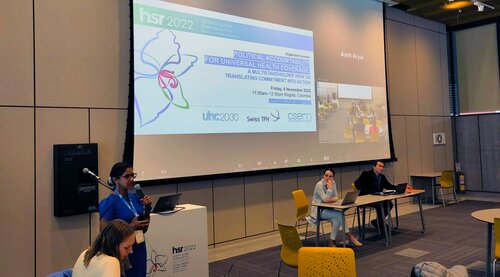La CSU2030 se réjouit d'accueillir plusieurs nouveaux membres...
9 novembre 2022
On 4 November 2022, UHC2030 with the Swiss Tropical Health Institute (SwissTPH) and the UHC2030 Civil Society Engagement Mechanism (CSEM) led a conversation on political accountability for universal health coverage (UHC).

by Carthi Mannikarottu and Anna Socha
On 4 November 2022, UHC2030 with the Swiss Tropical Health Institute (SwissTPH) and the UHC2030 Civil Society Engagement Mechanism (CSEM) led a conversation on political accountability for universal health coverage (UHC) with health policy and systems researchers from around the globe.
The session was part of the Seventh Global Symposium on Health Systems Research (HSR2022), held in Bogotá, Colombia with the theme of “Health Systems Performance in the Political Agenda: Sharing Lessons for Current and Future Global Challenges.”
Tracking actions on commitments towards UHC is essential for government accountability and transparency. Through this process we can obtain insights into why global progress towards UHC is off track to reach the goal of covering an additional one billion people by 2023. This session stemmed from UHC2030 work in tracking political commitments torwards UHC through the State of UHC commitment review and convened multilateral partnerships, civil society, academics and policy-makers to discuss ways to improve accountability for UHC through commitments, policies, and system change.
Dr. Sania Nishtar, the UHC2030 Political Advisory Panel & Pakistan Senate member, opened the session with a moving statement on the need for UHC to advance health equity. She set the scene with an overview of global political commitments to UHC, such as the United Nationals High Level Meeting in 2019 and the upcoming United Nationals High Level Meeting in 2023.
Akihito Watabe (UHC2030) presented the State of the UHC Commitment review’s context, background, and application. UHC2030’s state of UHC commitment review alongside the country level dashboard on UHC commitments were presented and used as a starting point for discussion. Daniel Cobos (SwissTPH) and Anna Socha (SwissTPH) explained the methodology including the research questions and data sources, and presented preliminary key findings from the synthesis. Specifically, a new conceptual framework for UHC commitment tracking was presented, which spans rhetorical, institutional, and operational commitments, which was applied to 145 countries’ UHC political commitments since 2000. UHC Synthesis preliminary findings highlight how many countries have made a wide range of commitments to UHC and recognized the importance of UHC in their policies; however, gaps persist between policy, implementation and results. For example, there is a lack of clear and comprehensive strategies and reporting on UHC, evidence of fragmented approaches to achieving UHC, and lack of involvement of non-state actors.
To demonstrate accountability for UHC in action, a cross-country regional case study was presented on consultations across the Asia Pacific region for improving UHC. Jennifer Ho (APCASO; CSEM) then highlighted civil society and community consultations led by the CSEM including the global methodology and findings from the Asia-Pacific region. In 2021 and 2022, CSEM hosted and moderated 37 focus group discussions with civil society and advocates from various countries where advocates shared ground-level perspectives on key challenges to engaging in health policymaking and implementation and provided recommendations for political leaders to help enhance accountability efforts.
This was followed by a panel on the political challenges on UHC and the role of accountability mechanisms. Panelists included Amit Aryal (advisory to the former Minister of Health, Nepal), Karol Rojas (researcher, University of Costa Rica), and Masaki Inaba (program director, Africa Japan Forum; CSEM); moderated by Carthi Mannikarottu (CSEM) and Anna Socha (SwissTPH).
Drawing on his work in Nepal, Amit Aryal discussed how the technical nature of the UHC dialogue often limits who engages in the policy, implementation, and accountability discussions. He called for the need to mainstream UHC conversations through civil society and community engagement, and bring it to the public political agenda at the country level.
Masaki Inaba echoed this recommendation in his discussion on the findings of the CSEM-supported country consultation in Japan. Despite progress made on UHC, individuals facing multiple vulnerabilities are often left behind and are rarely made aware of the political commitments on UHC to hold leaders accountable. The greater the vulnerability of an individual, the greater the time, cost, labor, and psychological burden required for that person to access health and medical care.
Finally, Karol Roja highlighted the context of the Central America region and her own work in Costa Rica to highlight the barriers to achieving equitable UHC, including fragmented systems and multiple actors poorly coordinated and governed. She recommended a new universal social policy that recommits to protecting everyone’s right to health.
The participants heard robust and diverse perspectives on the various challenges facing policy makers and advocates on the road to UHC. The State of the UHC Commitment Review is a critical tool in the kinds of accountability mechanisms that will help establish and maintain equitable health systems.
